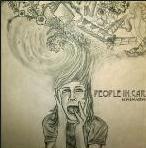You have to be a self-important egomaniac with too many guitar pedals to make this kind of music. Oh, and you have to smoke a lot of pot.
Or be in the Mars Volta. You decide which one is worse.
Etay Pisano, formerly of Aberdien, is now People in Cars, playing all his own instruments, writing all his own music, self-releasing the tracks vis a vis the Internet with the aid of that Snocap program the shills at MySpace came up with. Unsurprisingly, it sounds a lot like Aberdien, which means a menagerie of guitar sounds (mostly distorted, mostly with some form of delay).
What's the idea behind all that, not just in Pisano's case, but in the case of other bands/artists who go a similar route? I suppose it's a matter of giving the overdriven guitar the same kind of credibility we give the violin or the piano. Maybe the whole modern rock instrumentation, in fact, is trying to accomplish something as lush and tonally evocative as an orchestra, except with a much smaller apparatus and without substituting intimacy for the grandiose (prog-rockers can't be jazzbos, after all).
If that's the point, and if the listener needs to be able to keep a straight face about all the ego involved in order to enjoy what they're hearing, then Pisano could do much, much worse. Though it's hard to hear the intent of something so thoroughly layered through the bullshit compression of MPEG layer 3 audio, every included note seems to be played precisely and its sound chosen carefully.
What makes Uninvent stand apart from many records with similar goals or assembly methods, however, is its understanding of the way in which the included performances must remain humble to match its own sonic goal and musical aesthetic. Progressive music does not necessarily beg for incredibly technical performance and content that is conceived on a level more intellectual than musical. These things draw listeners to particular elements of the individual artistic agendas involved in the music-making and distract from what should be the primary focus: the broadness and resonance of the entire piece.
In this case, there's only one agenda involved, and the person behind it seems to understand that each of the many, many fantastic vocal performances and intriguing guitar riffs is just a small instrument within what is a fairly complicated production landscape. This is not to suggest that there isn't plenty of impressive singing and guitar playing going on or that there aren't small punctures in the technical envelope Pisano is operating within, but he seems to understand those aren't the point, just a logical part of the process.
What keeps this record from being any better is just as meta as the considerations of the genre it's in: What's the point? It's hard to hear a reason for the songs in the songs themselves and easy to hear a lot of noodling for noodling's sake. The lyrics are random, hit-or-miss and less sincere than even Pisano's romance-influenced Aberdien-era musings. People in Cars would be pretty incredible music if he took a few moments away from the pot smoke to think about what's so interesting about making this music, anyway.
